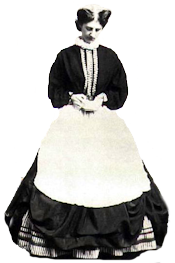13th July (Monday).—The luxury and comfort of New York and Philadelphia strike one as extraordinary after having lately come from Charleston and Richmond. The greenbacks seem to be nearly as good as gold. The streets are as full as possible of well-dressed people, and are crowded with able-bodied civilians capable of bearing arms, who have evidently no intention of doing so. They apparently don’t feel the war at all here; and until there is a grand smash with their money, or some other catastrophe to make them feel it, I can easily imagine that they will not be anxious to make peace.
I walked the whole distance of Broadway to the Consul’s house, and nothing could exceed the apparent prosperity; the street was covered with banners and placards inviting people to enlist in various highsounding regiments. Bounties of $550 were offered, and huge pictures hung across the street, on which numbers of ragged greybacks[1] terror depicted on their features, were being pursued by the Federals.
On returning to the Fifth Avenue, I found all the shopkeepers beginning to close their stores, and I perceived by degrees that there was great alarm about the resistance to the draft which was going on this morning. On reaching the hotel I perceived a whole block of buildings on fire close by: engines were present, but were not allowed to play by the crowd. In the hotel itself, universal consternation prevailed, and an attack by the mob had been threatened. I walked about in the neighbourhood, and saw a company of soldiers on the march, who were being jeered at and hooted by small boys, and I saw a negro pursued by the crowd take refuge with the military; he was followed by loud cries of ” Down with the b——y nigger! Kill all niggers!” &c. Never having been in New York before, and being totally ignorant of the state of feeling with regard to negroes, I inquired of a bystander what the negroes had done that they should want to kill them? He replied, civilly enough—” Oh sir, they hate them here; they are the innocent cause of all these troubles.” Shortly afterwards, I saw a troop of citizen cavalry come up; the troopers were very gorgeously attired, but evidently experienced so much difficulty in sitting their horses, that they were more likely to excite laughter than any other emotion.
[1] The Northerners call the Southerners “Greybacks,” just as the latter call the former “Bluebellies,” on account of the colour of their dress.











